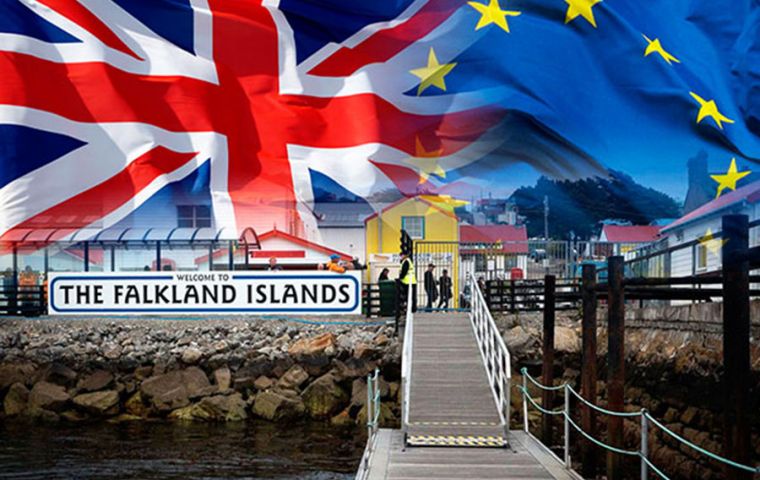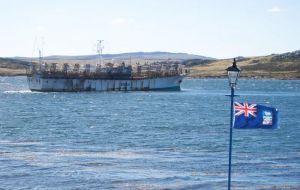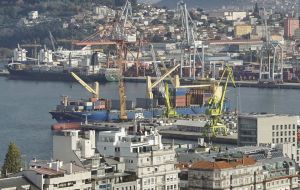MercoPress. South Atlantic News Agency
The Falkland Islands states its position: Preparing for Brexit
 MLAs have had two objectives: to secure continued tariff and quota free trade with the EU27 and UK, and to ensure Falklands are as prepared as possible for any Brexit scenario
MLAs have had two objectives: to secure continued tariff and quota free trade with the EU27 and UK, and to ensure Falklands are as prepared as possible for any Brexit scenario  Fishery exports could be subject to WTO tariffs of between 6% and 18%, and meat exports would be subject to an effective tariff of 42% (Pic M. Short)
Fishery exports could be subject to WTO tariffs of between 6% and 18%, and meat exports would be subject to an effective tariff of 42% (Pic M. Short)  Imposition of tariffs could result in delays at EU ports, although since FI already trade with the EU as a third country there should be no changes in the paperwork needed for exports
Imposition of tariffs could result in delays at EU ports, although since FI already trade with the EU as a third country there should be no changes in the paperwork needed for exports On 23 June 2016, the people of the UK and Gibraltar voted by a majority to leave the European Union (EU). In this article the Falkland Islands Government (FIG) sets out what work has taken place since the referendum to prepare the Falkland Islands for Brexit.
The Falkland Islands have enjoyed a special partnership with the EU since the UK entered in 1973, which is formalized through the Overseas Association Decision (OAD) allowing us to benefit from tariff and quota free access for fishery and meat products exported to the EU.
In 2017, the EU27 was the destination for 94% of our fisheries exports by weight and one-third of our meat exports. As a result of Brexit, the OAD will no longer apply to the Falkland Islands or other UK Overseas Territories (OTs).
Falkland Islands Government (FIG ) does not question Brexit; we respect the right of the people of the UK to determine their own future. However, it is vitally important that our current access to EU markets is retained. Anything less could have a detrimental impact on the Falkland Islands’ economy and on government revenues.
Over the last two and a half years, MLAs have had two objectives: to secure continued tariff and quota free trade with the EU27 and UK, and to ensure the Falkland Islands are as prepared as possible for any Brexit scenario.
Working with the UK Government
Working closely with Falkland Islands Fishing Companies Association (FIFCA) and Falkland Islands Meat Company (FIMCo) , FIG has undertaken economic analysis to understand the potential impact of tariffs on our exports of fish and meat, and on our economy more generally.
This information has been shared with the UK Government.
We have also engaged closely with UK Government officials, ensuring that Brexit negotiations take into account potential impacts on the Falkland Islands.
FIG has greatly appreciated the positive and constructive working relationship with these officials, as well as the support we have received to identify options that might help address threats to our meat and fish exports.
Engagement with politicians and the media
Since the referendum, MLAs, FIG officials, the FIG Representative in the UK and industry representatives have raised awareness and built support for the Falkland Islands’ position with media and politicians in the UK and Brussels, as well as regional influencers in Spain. As many of you know, the Falkland Islands’ stand at last year’s party political conferences focused on Brexit and it was encouraging to see so many Labour and Conservative politicians supporting the need for a good Brexit deal for the Falkland Islands.
Trading with the UK after Brexit
Whether the UK leaves the EU with a deal or not, our trading relationship with the UK will still change. In recent months FIG has worked closely with the UK Government to develop a new Free Trade Agreement between the OTs and the UK. This agreement ensures continued tariff and quota free trade between the Falkland Islands and the UK. Last week the UK Government announced details of its tariff free regime for exports from the UK and notified relevant trade bodies that exports of meat and fish from the Falkland Islands will continue to remain tariff and quota free. However, changes to paperwork could result in delays at UK ports. At the same time, officials in DEFRA (Department for Environment, Food & Rural Affairs) have developed a new notification system (IPAFFS) for exports from the Falkland Islands to the UK and staff in our Veterinary Department undertook training for the new system this week.
Trading with the EU27 after Brexit
How the Falkland Islands continues to trade with the EU depends on whether or not the UK Government achieves a Withdrawal Agreement. If it does, we will continue to trade with the EU27 on current terms during the implementation period (up to at least December 2020). During this period the UK Government will negotiate a new Free Trade Agreement with the EU27. FIG would expect to be fully engaged by the UK Government in discussions that affect our meat and fish sectors.
If the UK leaves the EU without a deal, either on 29 March or at a later date following an extension of the Article 50 process, we understand that the UK Government would immediately seek to negotiate a Free Trade Agreement with the EU27. There will be no implementation period, so tariffs could be applied to Falkland Islands’ exports to the EU from the date of departure.
We would estimate our fishery exports to be subject to WTO tariffs of between 6% and 18%, and meat exports would be subject to an effective tariff of 42%. The imposition of tariffs could result in delays at EU ports, although as we already trade with the EU as a third country there should be no changes in the paperwork needed for fish or meat exports.
EU funding
Although all funding already secured through EU programs by FIG, SAERI, and Falklands Conservation is expected to cease once Brexit is finalized, the UK Government has stated it will take over any outstanding commitments so that projects and activities can be completed seamlessly.
Along with our fellow UK OTs, we will continue to work with the UK Government to identify options to replace this EU funding.
What is likely to happen?
At the time of writing FIG does not know; much will depend on votes and wider events in Brussels and Westminster next week.
However, as 29 March approaches, FIG will continue to engage constructively and proactively with officials in the UK and with supportive politicians in Westminster, Brussels, and at a regional level in Spain. We continue to routinely meet with companies in the affected sectors to update them on progress regarding Brexit and on no-deal planning in the UK and Spain.
On 25 March, MLAs are hosting a public meeting at 5pm in the Court and Assembly Chamber; as part of this meeting there will be an update on Brexit and an opportunity for members of the public to ask questions. FIG (Penguin News)




Top Comments
Disclaimer & comment rulesCommenting for this story is now closed.
If you have a Facebook account, become a fan and comment on our Facebook Page!